MercoPress. South Atlantic News Agency
Tag: Merval
-
Tuesday, August 4th 2020 - 10:40 UTC
Argentine media and markets agree an agreement has been reached with bondholders

Argentina and most of its top creditors are moving closer to an agreement to restructure US$ 65 billion of bonds, according to government sources in the Buenos Aires media. Likewise, the prospects of an agreement triggered a bonds rally, and the Merval stock index gained 6,6% the most in a month.
-
Monday, September 9th 2019 - 09:57 UTC
Another week of uncertainties begins in Argentine markets
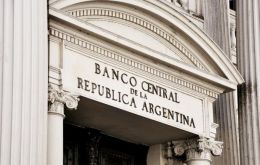
Another volatile week with still many uncertainties begins this Monday for Argentina even when some of the latest measures adopted by the administration of President Mauricio Macri helped to calm markets, debilitating apocalyptic forecasts.
-
Thursday, March 28th 2019 - 09:39 UTC
Argentine Peso slides to an all time low and country risk climbs to almost 800 points
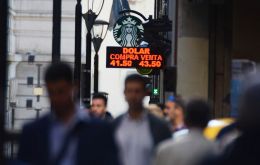
The Argentine Peso slid to all-time lows against the dollar as concerns about inflation, weak growth and October's presidential election weighed. The currency has lost 14% so far this year and the weakness raises fears of a repeat of the currency crisis of 2018 when the Peso lost half its value against the dollar.
-
Wednesday, March 27th 2019 - 08:48 UTC
Argentine financial markets jittery over October elections uncertainty

Investors in Argentina are starting to get the jitters. The gap in yield between local and U.S.-issued bonds has roughly doubled in the last month in the face of stubborn inflation and mounting peso outflows, heaping pressure on President Mauricio Macri ahead of elections later in the year.
-
Thursday, March 7th 2019 - 09:53 UTC
Argentina and Brazil markets open Wednesday with steep losses
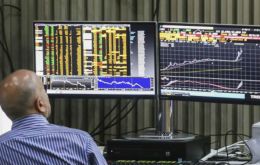
Latin American stocks hovered near 2019 lows on Wednesday led by steep losses in Argentina and Brazil which resumed trading after a two-day Carnival holiday, while currencies of oil exporters in the region fell as crude prices came under pressure. MSCI's index of Latin American stocks fell 1.3%, tracking losses across the region, barring Chile and Colombia which ended higher.
-
Wednesday, January 30th 2019 - 08:54 UTC
Latin American markets outperform world stocks struggling over US/China trade talks

Latin American stocks rose on Tuesday, outperforming world stocks that struggled to hold gains ahead of keenly awaited U.S.-Sino trade talks, earnings of top technology companies and an impending U.S. Federal Reserve decision on interest rates.
-
Tuesday, October 2nd 2018 - 08:21 UTC
Argentine Peso rises 4% after central bank sells seven-day notes paying 72%
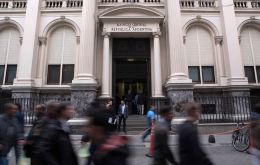
The he Argentine peso climbed more than 4% on Monday trading on the back of a debt sale by the central bank aimed at mopping up excess liquidity and signs that the International Monetary Fund (IMF) is solidly behind the administration of president Mauricio Macri.
-
Friday, September 28th 2018 - 08:58 UTC
Brazilian currency strengthens below 4 to the dollar: first time in five weeks
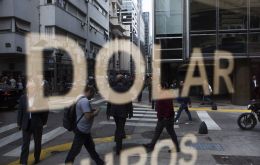
The Brazilian currency dipped under four Real to the dollar for the first time in five weeks at close on Thursday as the markets reacted favorably to the emergence of two clear presidential election frontrunners. The Real closed at 3.99 to the US dollar just two weeks after hitting a record low of almost 4.2 to the dollar -- it's lost around 17% since the start of the year.
-
Wednesday, September 12th 2018 - 08:13 UTC
Argentina equities and Peso slide, in line with Brazil's political situation
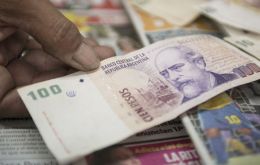
Argentine equities and the Peso continued on Tuesday their slide amid global trade tensions, uncertainty about Argentina's 2019 fiscal budget, talks between the government and the International Monetary Fund and the political situation in Brazil, which together with China are Argentina's main trade partners
-
Tuesday, September 11th 2018 - 09:12 UTC
Argentine equities and Peso lose ground on Monday: IMF and budget concerns

Argentine equities and the peso both lost ground on Monday as analysts said intervention in the foreign exchange market by the nation's central bank may prove less successful than originally hoped.
